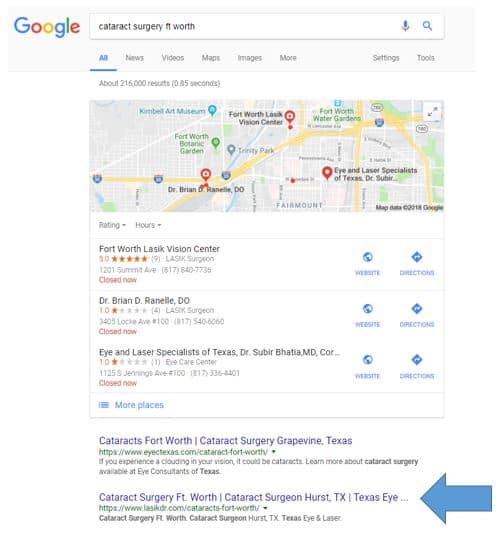January 2018 Ceatus Chronicles
Recent Posts
- Am I getting a good ROI for my Digital Marketing Dollars? 3 Ways to Check Your Digital Marketing ROI
- Should You Hire a Digital Marketing Agency with Experience Representing Healthcare Practices?
- CEATUS CEO Featured by Healio on the Pathway to Purchase for Eye Care and Treatment
- Does Your Website Need to Be ADA Compliant?
- CEATUS Shares Information on Pixel Trackers and HIPAA Violations
Categories
- abdominoplasty
- Articles & Publications
- Articles Published
- Bariatric Surgery
- Botox
- Breast Augmentation
- Breast Implants
- breast lift
- breast reconstruction
- breast reduction
- Bucks County Smiles
- Case Studies
- Cataract Surgery
- cataracts
- CEATUS Courses & Lectures
- CEATUS News
- CEATUS On The Road
- Chicago Plastic Surgeon
- Chicago Plastic Surgery
- Clients
- Content Marketing
- coolsculpting
- Cosmetic Dentistry
- Cosmetic Dentists
- cosmetic surgeon
- cosmetic surgeons
- Cosmetic Surgery
- dallas
- Dental Implants
- Dentist
- Dentistry
- Dentists
- dermatologist
- Digital Marketing Trends
- Dr James Lewis
- Dr. Humberto Palladino
- Dr. Vanessa Voge
- Dry Eye Institute
- drye eye treatment Philadelphia
- eye care
- eyelid lift
- Eyelid Surgery
- Facelift
- Facial Plastic Surgery
- fraxel
- Gastroenterology
- glaucoma treatment
- Greenhich Smartlipo
- Image
- Johannesburg LASIK
- LASIK
- LASIK Cost
- Lead Generation
- Liposuction
- Newsletters
- Ophthalmologist
- Ophthalmology
- Pay Per Click (PPC)
- plastic surgeon
- Plastic Surgeons
- Plastic Surgery
- Practice and Business Management
- Reviews & Reputation
- Search Engine Optimization
- Social Media Marketing
- Surgeons
- Uncategorized
- Website Design
- Website Management
Archives
- May 2024
- December 2023
- October 2023
- August 2023
- July 2023
- March 2023
- November 2022
- September 2022
- August 2022
- July 2022
- November 2021
- September 2021
- August 2021
- June 2021
- May 2021
- April 2021
- March 2021
- February 2021
- January 2021
- November 2020
- October 2020
- September 2020
- August 2020
- July 2020
- March 2020
- February 2020
- August 2019
- July 2019
- June 2019
- April 2019
- March 2019
- February 2019
- January 2019
- December 2018
- November 2018
- October 2018
- September 2018
- August 2018
- July 2018
- June 2018
- May 2018
- April 2018
- March 2018
- February 2018
- January 2018
- December 2017
- November 2017
- October 2017
- September 2017
- August 2017
- July 2017
- June 2017
- May 2017
- April 2017
- March 2017
- February 2017
- January 2017
- December 2016
- November 2016
- October 2016
- September 2016
- August 2016
- July 2016
- June 2016
- May 2016
- April 2016
- March 2016
- February 2016
- January 2016
- December 2015
- November 2015
- October 2015
- September 2015
- August 2015
- July 2015
- June 2015
- May 2015
- April 2015
- March 2015
- February 2015
- January 2015
- December 2014
- November 2014
- October 2014
- September 2014
- August 2014
- July 2014
- June 2014
- May 2014
- April 2014
- March 2014
- February 2014
- January 2014
- December 2013
- November 2013
- October 2013
- September 2013
- August 2013
- July 2013
- June 2013
- May 2013
- April 2013
- March 2013
- February 2013
- January 2013
- December 2012
- November 2012
- October 2012
- September 2012
- August 2012
- July 2012
- June 2012
- May 2012
- April 2012
- March 2012
- February 2012
- January 2012
- December 2011
- November 2011
Click It, Click It Good
Get Your SEO In Shape This Year

Google and the other search engines constantly update their search algorithms to keep abreast of human behavior patterns. In order for your practice to prosper in 2018 and beyond, your digital marketing agency will need to pay attention to two important behavioral trends that the search engines will be watching.
Conversational Search
Google, Bing and Yahoo! have been adjusting their algorithms to better respond to search requests based on conversational speech, versus pure key word search. For example, in conversational speech a consumer is less likely to ask Google for “plastic surgery Newport beach” or “LASIK san diego,” and more likely to say something like, “find me the plastic surgeon in Newport beach with the best reviews” or “which cosmetic dentist in san diego has the best results?”
The key to responding to this trend is content creation that targets longer search queries; i.e. “long tail search.” A good strategy should have two components: high-quality, comprehensive procedure information and “fresh” education-oriented content dealing with timely topics (Q & As, Do’s and Don’ts, seasonal topics, etc.). The procedure content (known as “evergreen content”) is the anchor for the site while the fresh educational content keeps the site relevant to the search engines on a continual basis.
Off-site Branding Factors
The other major trend for 2018 involves continual development of your online brand, separate from (although coordinated with) your website. Google and the other search engines use this brand information to make decisions about rankings.
Off-site branding factors include:
Reviews
A comprehensive portfolio of positive patient comments spread across a wide range of review sites is a must. Practices often understand the importance of reviews, but focus their review strategies across too few review sites. This strategy limits the breadth of the online brand.
Practices need to regularly solicit reviews on 7 to 10 of the most important sites for elective health care – Google, HealthGrades, RateMDs, Vitals, Yelp, Facebook, Facebook, RealSelf (primarily for plastic surgery), City Search, etc.
Keep in mind that consumers often use sites like Yellow Pages and City Search to look up phone numbers; and once they are on these sites, they start reading reviews.
Also, a practice’s reviews should be published on the practice website as well as social media. Publishing reviews on your website and Facebook from a wide range of review sites builds credibility and enhances your reputation. It also improves engagement on both your website and your Facebook page; increased engagement is an important ranking signal for the search engines.
Social Media
A highly engaging social media presence, where your fans regularly like and share your information with others, generates new patients and builds your online presence, separate from your website.
Facebook is the most important social media platform, so practices need to ensure that, at a minimum, they have a vigorous Facebook strategy. If budget and staff resources permit, Instagram and Twitter should be added.
Again, higher engagement on these platforms sends a signal to Google that your digital presence is a valuable resource for consumers, and this translates to higher rankings for your website.
Tip: Practices often misuse social media as a platform for selling and promoting rather than posting educational content designed to engage prospective and current patients. Don’t be one of these practices.
Medical Advice Websites
Profiles of you and your practice on credible third-party directory sites build your visibility among consumers and enhance your “off-site” brand with the search engines.
Practices often evaluate the importance of directory sites strictly by the number of email leads generated from the profile page, and overlook the beneficial branding effects. High-quality medical advice websites also offer detailed profile pages, which can add to the power of your citations. Citations are now a very important factor in Google’s website ranking strategy.
Don’t Fall Behind!
In a nutshell, the days of obtaining high Google rankings by inserting specific key words on a few pages of your site are rapidly drawing to a close. Online marketing success has moved beyond ranking for a narrow array of the vanity terms, such as “plastic surgery newport beach,” “cosmetic dentist NYC” and “lasik san diego.” This strategy has been replaced by a new system that focuses on multiple factors, including overall traffic, social media engagement, a constantly improving reputation score and the number/prominence of locations around the Web where your brand is promoted.
Internet Tip of the Month
TurtleGeddon?
Slow-loading Mobile Sites May Affect the Google Race

Last year’s Google update, a.k.a. “MobileGeddon,” brought changes to rankings for mobile sites. This year, Google strikes again, and this time it’s against mobile websites with slow load times. We’re calling it “TurtleGeddon.”
As always, Google’s announcement creates more questions than it answers. Google did not provide any detail with regard to “how slow is too slow.” But in the aftermath of MobileGeddon, it does appear that Google is favoring optimized mobile-friendly sites, especially for queries initiated on mobile devices. With this in mind it is imperative that you make sure your mobile website (not to mention your desktop site) is up to speed and loading correctly.
Questions about your mobile website? Call us at 858-454-5505 or email us at contactceatus@ceatus.com.
Case Study
Instant Optimization
Give Them What They Want!
Background: As the attention span of Internet users continues to shrink, and as the already impatient Millennials become a larger portion of the elective health care market, it is imperative that practice websites make it easy to find procedure information.
If visitors have to look for or navigate to the information on your site to find it, they bounce back to Google and visit a different site that makes the information easier to find. This poor engagement by users can seriously damage website rankings, as well as conversion.
Search engine optimization techniques should be structured so that each procedure appears in the search engine results for applicable searches. This way, the prospective patient can find the information immediately when he or she enters the site from the search engines.
If someone types in a search phrase for procedure information in a given geographic market (e.g., “breast augmentation sacramento,” “dental veneers charlotte” or “cataract surgery ft worth”), it is imperative that he or she lands on your website page devoted to that procedure. If not, bounce rates increase and conversion falls.
Most SEO companies do not understand this issue. They take a simplistic approach and optimize the site without targeting the website appropriately for each specific procedure. Rankings in general are typically not very good with these amateur SEO strategies.
More importantly, the homepage ends up ranking for the procedure-related search terms, and this spells D-I-S-A-S-T-E-R. When this happens, website visitors (i.e., potential patients) have to navigate to another page to find the information they originally searched for. The result is Poor Engagement that Hurts Rankings.
And as if this weren’t bad enough, rankings for the homepage suffer as well. The homepage is just too generic and does not include enough specific procedure information to be considered a top resource by Google. When the homepage ranks at the top of the search results for a wide range of procedure terms, it sends Google the wrong message.
To make matters even worse, once Google has made up its mind about which page should rank for which procedure, it is very difficult to change, unless the SEO team is highly skilled. The site has to be torn apart and restructured to “retrain” Google on how to value the various pages of the site.
Problem: This month’s case study involves an eye care practice in Ft. Worth, TX that came to Ceatus with a big problem. Thanks to amateurish SEO techniques, the homepage, www.lasikdr.com, ranked for eye care procedure search terms. Although the site had a specific page about cataract surgery, this was not the page that ranked for the term “cataract surgery ft worth.” Instead, the homepage did.
The practice marketing manager became frustrated that the site could never move above the bottom of the first page of Google. She could not understand why the rankings stalled. The practice’s SEO company at the time tried to convince her that nothing could be done to improve the site’s rankings, traffic and patient flow. Fortunately, she didn’t believe them.
Solution: Enter the SEO expertise of Ceatus Media Group. Our team educated the practice as to why their rankings were stuck at the bottom of the first page, and explained that the SEO had to be completely redone to “teach” Google which page should rank for each procedure search term. In this particular case, the practice website had to be restructured so that all of the ranking signals on and off the site were pointed to the correct pages.
Results: A month after their new Ceatus-designed SEO strategy was launched, the site’s Google rankings changed so that the correct page (https://www.lasikdr.com/cataracts-fort-worth/) ranked for the search term “cataract surgery ft worth.” Over the next 4 to 6 weeks, the site’s rankings climbed to the top 3 on Google, and they are still climbing. And, because the page is dedicated and totally focused on cataract surgery, conversion has increased, the bounce rate has fallen and, most importantly, patient flow from the website has increased. Now patients interested in cataract surgery in Fort Worth land on the correct page. They no longer have to navigate to other pages on the site to learn about cataract surgery.

The site moved up from No. 9 to No. 2 for the search term “cataract surgery ft worth,” because now the correct cataract surgery page is the target of the SEO efforts.
Questions about your SEO Strategy? Call us today at 858-454-5505 or email us at contactceatus@ceatus.com.
Maximize Your Internet Strategy
Come by the CEATUS booth for a FREE website evaluation!
Caribbean Eye

Cancun, Mexico
February 2-6, 2018
Is your Digital Marketing Strategy out of FOCUS? Come visit CEATUS at this year’s Caribbean Eye conference and see how we can help you grow your practice.
Also, join CEATUS CEO David Evans, PhD, for his presentation:
“Blending Traditional and New Marketing”
Saturday, February 3
8:07am- 8:14am
Don’t miss out!
Dallas Rhinoplasty

Dallas, Texas
March 2-3, 2018
Booth 47
Stop by booth 47 and find out how to expand your Digital footprint!
CEATUS CEO David Evans, PhD, will also be speaking at the social media panel presentation:
“What’s New, What’s True, What’s Ethical”
Wednesday, February 28
6:30pm- 7:30pm
AADPA

White Sulphur Springs, WV
March 7-10, 2018
Give your Internet strategy a smile makeover. Stop by our table to talk to a CEATUS Internet Marketing Expert and get a FREE Digital Strategy Review!
Not attending any of these shows? Give us a call (858-454-5505) for a FREE Digital Strategy Evaluation!

Snow Kidding!
Winter Olympic Moments that Took Our Breath Away!
The Miracle on Ice
The 1980 U.S. Men’s Olympic Hockey Team was a hodgepodge of amateur and collegiate players, and most people didn’t believe they were capable of winning much of anything. But thanks to their determination, grit and commitment they ended up beating the Soviet powerhouse team in a memorable 4-3 semifinal and then went on to beat Finland to win gold! Miracles do happen!
The History-making Jamaican Bobsled Team
The minute they took to the track at the 1988 Calgary games the Jamaican bobsled team won over the hearts of Olympic viewers and media alike, even inspiring the Disney movie Cool Runnings. While they came out medal-less, their inspiring story is one of the Winter Olympics’ finest moments to date!
Shaun White and the Double McTwist
Know as the Flying Tomato, Shaun White has been captivating Olympic viewers since his first Olympic appearance in 2006. Inarguably the best snowboarder in history, he shocked viewers when he elected to take another run during the 2010 Vancouver Halfpipe finals (after already securing gold) and pulled off the most audacious halfpipe trick of all time: the “Double McTwist 1260.” White later dubbed it the “Tomahawk.”
Youngest Winter Olympics Winner Tara Lipinski
Age didn’t matter to Tara Lipinski as she entered the 1998 Olympic Games in Nagano, Japan. She came to win and win she did, becoming the youngest individual (at age 15) to win gold at a Winter Olympic Games. She holds the title to this day.
Canadian Ski Coach Helps Rival Skier
While competition is fierce at the Olympics, once in a while a story of stellar sportsmanship steals the show. One of Russian Anton Gafarov’s skis broke during the semifinals of the freestyle ski sprint. Gafarov realizes that elimination could be on the horizon but out of the sidelines rushes Canadian ski coach Justin Wadsworth with a replacement ski, thus allowing Gafarov to finish the race!
Austrian Hermann Maier Wins Against all Odds
Life may knock us down, but we must get up again. Enter Austrian Hermann Maier, who suffered a horrific crash on his first run of the 1998 Nagano winter olympics, one that could have left him seriously injured. Slightly shaken but undeterred, Maier returned to win two Olympic golds!
Golden Girl Peggy Fleming Wins the Only Gold for the U.S.
In 1961 a terrible plane crash killed the entire U.S. figure skating team, including Peggy Fleming’s old coach, thus devastating American figure skating for years. Determined to win and return dominance to figure skating for the U.S., Fleming skated her heart out, taking gold at the 1968 Olympics in Grenoble, France. It was the only U.S. gold that year.
Speed Skater Dan Jansen Skates Through Grief
In the early hours of February 14, 1988, the day of the 500-meter event, Jansen was informed that his 27-year-old sister was dying of leukemia. This news would alter the games for him and cause a series of unfortunate falls. However, in 1992, Jansen returned to the ice and surprised everyone with his unbelievable comeback and by winning gold in the 1000 meter race. Jansen then went on to skate the victory lap with his daughter in his arms, creating one of the most unforgettable moments in Winter Games history.
